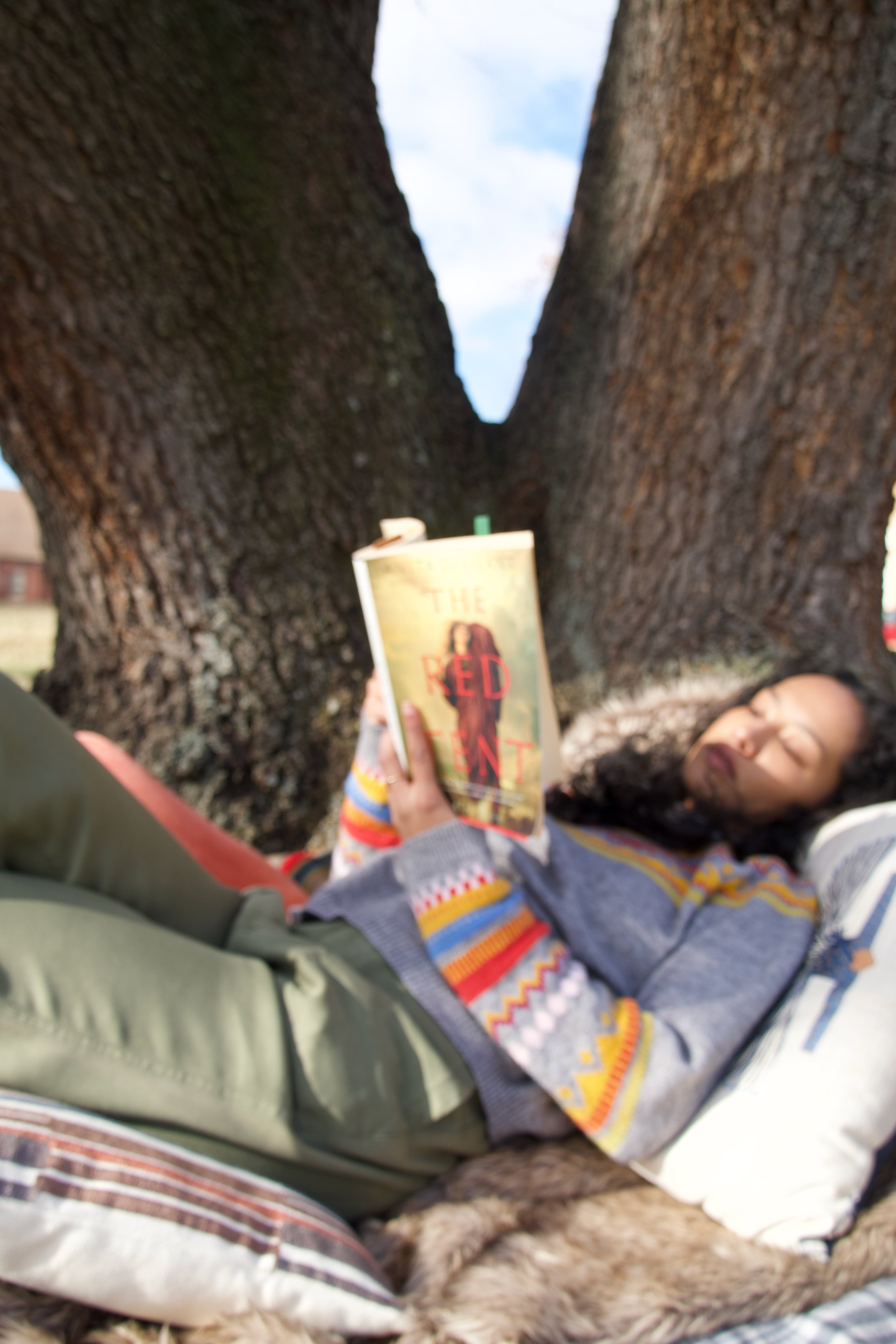Intimacy & Vulnerability:‘The Red Tent’ Analysis Part 1
I discuss the relationship between making ourselves vulnerable and finding true intimacy in the first part of this two-part analysis of Anita Diamant’s The Red Tent.
Final days of fall. Full look description below.
Note: This is the second installment of the All-Year Season Book Club series celebrating historic and unforgettable literary works and authors. This article contains spoilers. Read the first installment here.
To what extent is vulnerability a gateway to intimacy? As poet and philosopher David Whyte uttered in his book of essays Consolations II, “Intimacy is intimately related to our sense of having been wounded, and the startling intuition that my way forward into life, or into another person’s life will be through the very doorway of the wound itself. Intimacy invites me to learn to trust the way being wounded has actually made me more available, more compassionate and possibly more intimate with the world, by being opened in ways I never realised it was possible to be open…”
~
For the last two weeks I have been in Washington, D.C. reading The Red Tent by Anita Diamant, in which we are introduced to several complex relationship dynamics that shed light on such vulnerability and intimacy. Through the eyes of protagonist Dinah, the only daughter in a busy and growing family, we find themes of love, patriarchy, family and religion as she navigates her coming of age. The book takes us through three parts: Her mothers’ stories, Dinah’s story and her journey to Egypt. I am currently reading part three.
Enjoying ‘The Red Tent’ in a sweater (similar one) borrowed from Mom, Scanlan Theodore turtleneck, Officine Générale pants, Rothy’s flats, Uniqlo socks, Goldstories necklace, plus a borrowed necklace from Mom and Able accessories. Also, Bloomingville and Floof pillows and Pottery Barn x Pendleton blanket (on sale!).
As I make my way through the text I have reflected on how our earliest relationships determine our life path. While I struggle to make sense of the greater message of the story at this juncture, I derive the most meaning from the evolution each relationship undergoes throughout the book.
Jacob, for example, is plagued by nightmares of a confrontation with his estranged brother Esau. His anxieties are persistent and troubling to the entire family, and when Esau embraces Jacob with open arms and the two enjoy a pleasant reunion, it serves as a genuine shock. However, the reality of the deep and complicated love that exists in meaningful relationships is ever-present between them:
“And for all the fellowship of the night before, the sons of Isaac were not entirely reconciled, nor could they ever be. The scars they had borne for twenty years could not be erased with a single meeting, and the habits of those years, lived in such different worlds, were bound to come between them.”
This heartbreaking reality—The knowledge that love or a desire to reconcile is not always enough, brings about what essayist Maria Popova describes as a central “paradox of longing.” She writes,
“Because longing can be an addiction, because no active addict ever wants to give up their addiction — or can without a great deal of suffering — it can be terrifying and almost unbearably vulnerable to surrender to an intimacy so amply fulfilling that it leaves nothing to long for. And yet in that vulnerability lies our power and our freedom to transform a relationship from a tether of dependency into a slender cord of grace.”
In The Red Tent, while Jacob obsessed over what he expected to be a fierce and violent confrontation with his brother, the two found true intimacy by surrendering to the vulnerability that came from expressing love and grace to each other. The challenge then became facing the truth of their present-day relationship, which would never be what it was, regardless of love. This level of maturity and intimacy is what so many of us strive for, but can only dream of experiencing in our deepest relationships.
Author Anita Diamant’s fiction novel ‘The Red Tent,’ photographed in Rock Creek Park in Washington, D.C.
Yet, I do believe that vulnerability is our gateway to intimacy. It can take decades to get to know someone, and expressing our wounds and fears can often serve as the first step to deepening our relationships. In the last few years I have experienced some of the most challenging times, and through this pain I have found the most profound love.
~
With that, thank you so much for being here. If you are enjoying this All-Year Season Book Club series and are not subscribed below, I gently encourage you to! When you subscribe, you will hear from me in your inbox each time I post something new. I will be back very soon with part two of my analysis of The Red Tent. Until next week…
Yours Truly,
Kyoko
I am not compensated for the features listed in All-Year Season. My sincerest thank you to Goldstories for supporting the creation of this post.




